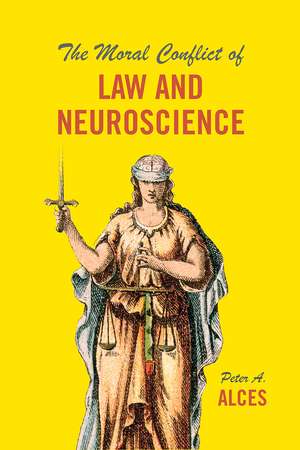The Moral Conflict of Law and Neuroscience
Autor Peter A. Alcesen Limba Engleză Paperback – 19 feb 2018
Law relies on a conception of human agency, the idea that humans are capable of making their own choices and are morally responsible for the consequences. But what if that is not the case? Over the past half century, the story of the law has been one of increased acuity concerning the human condition, especially the workings of the brain. The law already considers select cognitive realities in evaluating questions of agency and responsibility, such as age, sanity, and emotional distress. As new neuroscientific research comprehensively calls into question the very idea of free will, how should the law respond to this revised understanding?
Peter A. Alces considers where and how the law currently fails to appreciate the neuroscientific revelation that humans may in key ways lack normative free will—and therefore moral responsibility. The most accessible setting in which to consider the potential impact of neuroscience is criminal law, as certain aspects of criminal law already reveal the naiveté of most normative reasoning, such as the inconsistent treatment of people with equally disadvantageous cognitive deficits, whether congenital or acquired. But tort and contract law also assume a flawed conception of human agency and responsibility. Alces reveals the internal contradictions of extant legal doctrine and concludes by considering what would be involved in constructing novel legal regimes based on emerging neuroscientific insights.
Peter A. Alces considers where and how the law currently fails to appreciate the neuroscientific revelation that humans may in key ways lack normative free will—and therefore moral responsibility. The most accessible setting in which to consider the potential impact of neuroscience is criminal law, as certain aspects of criminal law already reveal the naiveté of most normative reasoning, such as the inconsistent treatment of people with equally disadvantageous cognitive deficits, whether congenital or acquired. But tort and contract law also assume a flawed conception of human agency and responsibility. Alces reveals the internal contradictions of extant legal doctrine and concludes by considering what would be involved in constructing novel legal regimes based on emerging neuroscientific insights.
Preț: 289.44 lei
Nou
Puncte Express: 434
Preț estimativ în valută:
55.39€ • 57.22$ • 46.10£
55.39€ • 57.22$ • 46.10£
Carte tipărită la comandă
Livrare economică 25 martie-08 aprilie
Preluare comenzi: 021 569.72.76
Specificații
ISBN-13: 9780226513539
ISBN-10: 022651353X
Pagini: 368
Dimensiuni: 152 x 229 x 23 mm
Greutate: 0.54 kg
Ediția:1
Editura: University of Chicago Press
Colecția University of Chicago Press
ISBN-10: 022651353X
Pagini: 368
Dimensiuni: 152 x 229 x 23 mm
Greutate: 0.54 kg
Ediția:1
Editura: University of Chicago Press
Colecția University of Chicago Press
Notă biografică
Peter A. Alces is the Rita Anne Rollins Professor of Law at the College of William and Mary and the author, most recently, of A Theory of Contract Law.
Cuprins
Acknowledgments, Debts, and Admiration
Preface, Premises, and Progress of the Argument
Chapter 1. Contours of the Conflict
Chapter 2. Neuroscience and Criminal Law Doctrine
Chapter 3. Neuroscience and Criminal Law Theory
Chapter 4. Neuroscience and Tort Law Doctrine
Chapter 5. Neuroscience and Tort Law Theory
Chapter 6. Neuroscience and Contract Law Doctrine
Chapter 7. Neuroscience and Contract Law Theory
Chapter 8. An Age of Realization
Notes
Bibliography
Index
Preface, Premises, and Progress of the Argument
Chapter 1. Contours of the Conflict
Chapter 2. Neuroscience and Criminal Law Doctrine
Chapter 3. Neuroscience and Criminal Law Theory
Chapter 4. Neuroscience and Tort Law Doctrine
Chapter 5. Neuroscience and Tort Law Theory
Chapter 6. Neuroscience and Contract Law Doctrine
Chapter 7. Neuroscience and Contract Law Theory
Chapter 8. An Age of Realization
Notes
Bibliography
Index
Recenzii
“If The Moral Conflict of Law and Neuroscience had been written by a neuroscientist, it would ‘merely’ be excellent—clear, elegant, and thoughtful. The fact that it was written by a legal scholar makes it extraordinary and very brave. To my knowledge, no such scholar has ever presented so clearly and convincingly a fatal incompatibilism—neuroscience is disassembling the folk psychological notion of human agency on which criminal justice rests. And in the end, Alces convicts the justice system, asserting that the notion of moral responsibility which justifies retribution is itself ultimately immoral."
“Alces argues that the law has for a long time simply got it wrong when it comes to understanding who we are and how we act. This misunderstanding, he asserts, stems from the failure to embrace hard determinism: the notion that we are a product of forces which are often beyond our control. Alces builds on the premise that moral responsibility is an illusion and argues that we need to be better served by a legal system that takes into account the burgeoning body of neuroscientific knowledge that questions whether we are truly responsible agents. Thought-provoking, challenging, and at times startling, The Moral Conflict of Law and Neuroscience raises the intriguing question of whether the law is failing us because it misunderstands the nature of human agency.”
“Questions concerning conflict between our legal system and rapidly emerging neuropsychological research are not new, but The Moral Conflict of Law and Neuroscience plumbs new depths. This serious and engaging study raises fundamental questions across the entire legal spectrum, from torts to contracts. Rather than warning of potential future problems, Alces combines meticulous legal analysis with impressive knowledge of psychological research to pose immediate challenges to some of our most basic assumptions.”
“A work of remarkable originality—provocative, challenging, and sweeping in scope. The book not only forges further into the criminal justice domain, with considerable originality and subtlety, it also extends into torts and contracts—areas almost entirely unexplored. Alces has a considerable command of these fields of law and likewise of the key neuroscientific accomplishments that bear on his analyses. In addition, he thinks clearly, logically, and with great penetrating insights. The book is bound to be a major landmark in the law and neuroscience landscape.”
